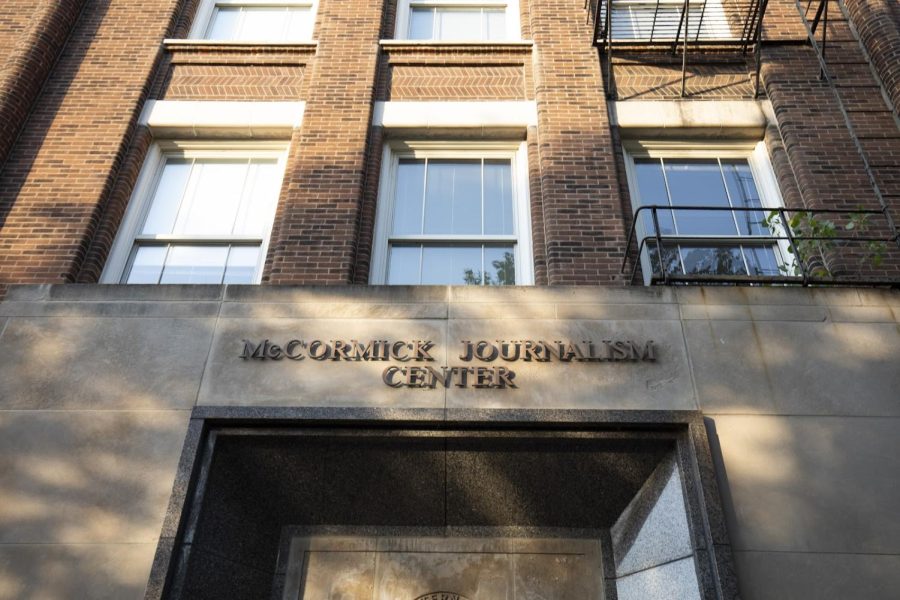Not all ‘gloom and doom’: Panel of journalists find hope amid a local news crisis
Joshua Hoffman/Daily Senior Staffer
Leading journalists evaluate the state of the local news crisis.
November 18, 2021
A panel of journalists discussed the importance of finding optimism during an ongoing local news crisis in a Wednesday webinar hosted by Evanston RoundTable.
Over 1,000 communities have become news deserts, completely devoid of local journalism due to problems with their financial models, decreasing ad revenue and declining subscriptions. According to the panelists, this has led to communities of uninformed citizens, unchecked government institutions and a decrease in civic engagement.
However, panelist and Chicago Sun-Times columnist Laura Washington said she doesn’t feel the “gloom and doom” of the crisis because of the evolution and success of Chicago’s local media landscape. Nonprofit, hyperlocal digital news sources such as Block Club Chicago, South Side Weekly and Crain’s Chicago Business cover a broad range of in-depth stories and make news more accessible to residents, Washington said.
“These news organizations show how vibrant the Chicago media ecosystem is,” Washington said. “In many ways, they’ve replaced or taken on some of the responsibilities the so-called legacy media is no longer able to perform.”
Tim Franklin, head of the Medill Local News Initiative, said adapting to nonprofit models has been a large source of success for some local newspapers. Panelists credited foundation funding for helping establish these nonprofit organizations.
While these foundations have helped address the local news crisis, Tracy Baim, president of The Chicago Reporter, cautioned against relying on the nonprofit model and emphasized the importance of diversifying revenue streams.
As larger publications enter the nonprofit world, Baim said, they take the bulk of available funding away from smaller organizations that benefit from the nonprofit model. Baim advocated for a system to ensure all local publications have an equal chance of obtaining funds from foundations.
“The foundation world needs to open up and understand how critical journalism is to every single issue they fund,” Baim said. “If you fund environmental racism, criminal justice reform, gun violence, LGBTQ issues, whatever you fund, you must fund the journalism that covers it, or the work won’t be amplified.”
Despite the scale of the local news crisis, the majority of the population is not aware of the problems the news industry is facing, said Medill Dean Charles Whitaker, who moderated the panel.
With a focus trained on national news, Washington said, most people forget about local publications. A 2019 Pew Research study found that 71% of Americans believe their local publications were financially well-off, even though newspaper industry advertising has declined by 67% since 2005.
Franklin compared the local news crisis to climate change: since the local news industry is declining slowly, many people are not feeling its impact yet, he said. Baim said indifference is also an issue.
“I don’t think the message of saving journalism resonates for anybody that’s not in journalism,” Baim said.
However, people are working across the country to find solutions for the crisis, Franklin said. Publications are adapting, journalists are starting their own niche publications and Congress is trying to pass the Local Journalism Sustainability Act, a bipartisan bill to support local news. The act would provide tax credits to local publications.
Franklin said the changes encourage him. Still, the crisis is not over yet.
“There is reason for optimism,” Franklin said. “But we need to get from one side of the bridge to the other, and the bridge is swaying and rocking, and the waters are roiling underneath. So we’ll see if we can get to the other side.”
Email: [email protected]
Twitter: @EmmaCRosenbaum
Related Stories:
— Medill receives $1 million grant from McCormick Foundation to support local news
— Northwestern starts local news initiative in partnership with 3 newspapers


